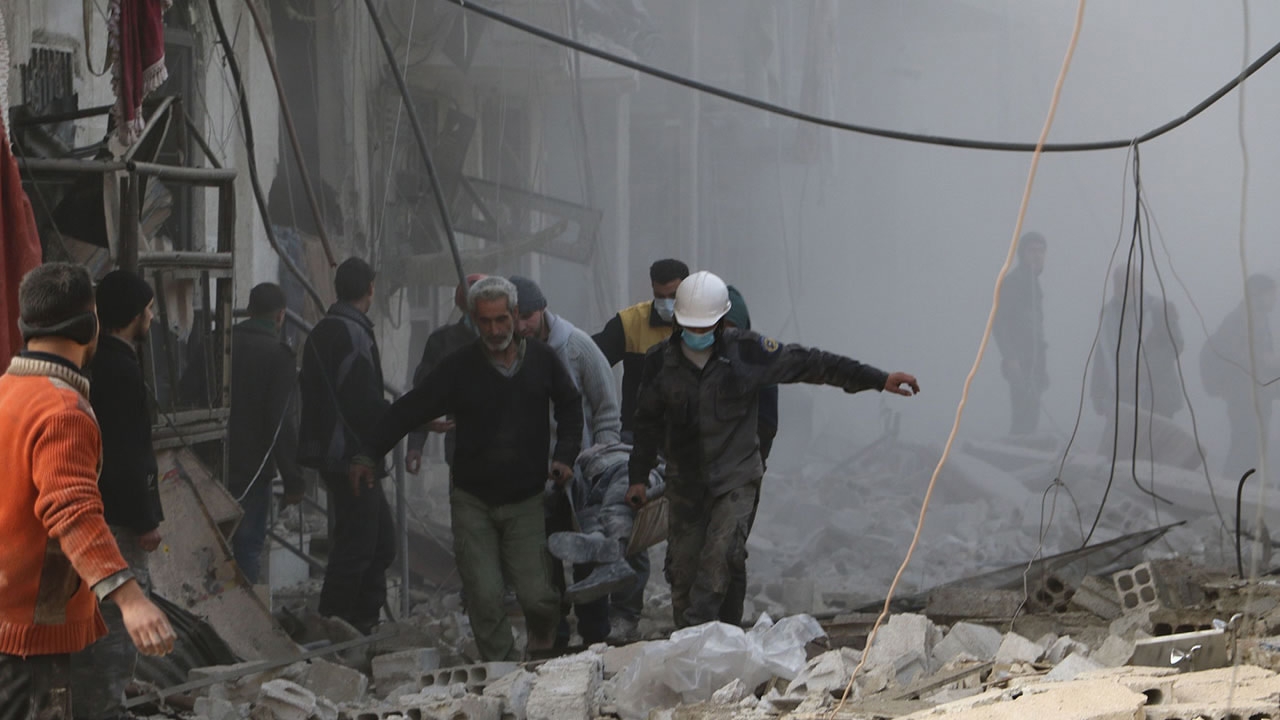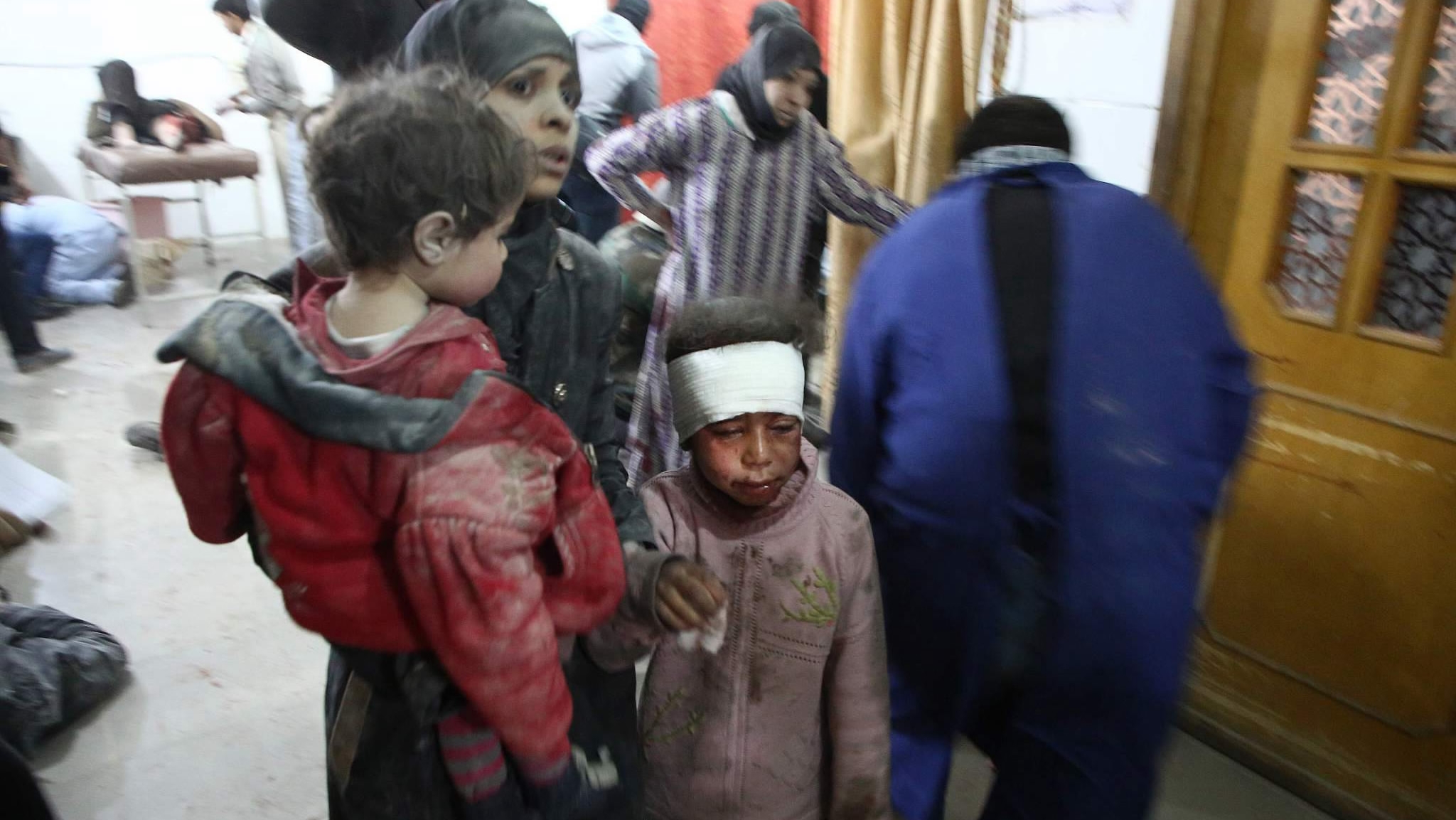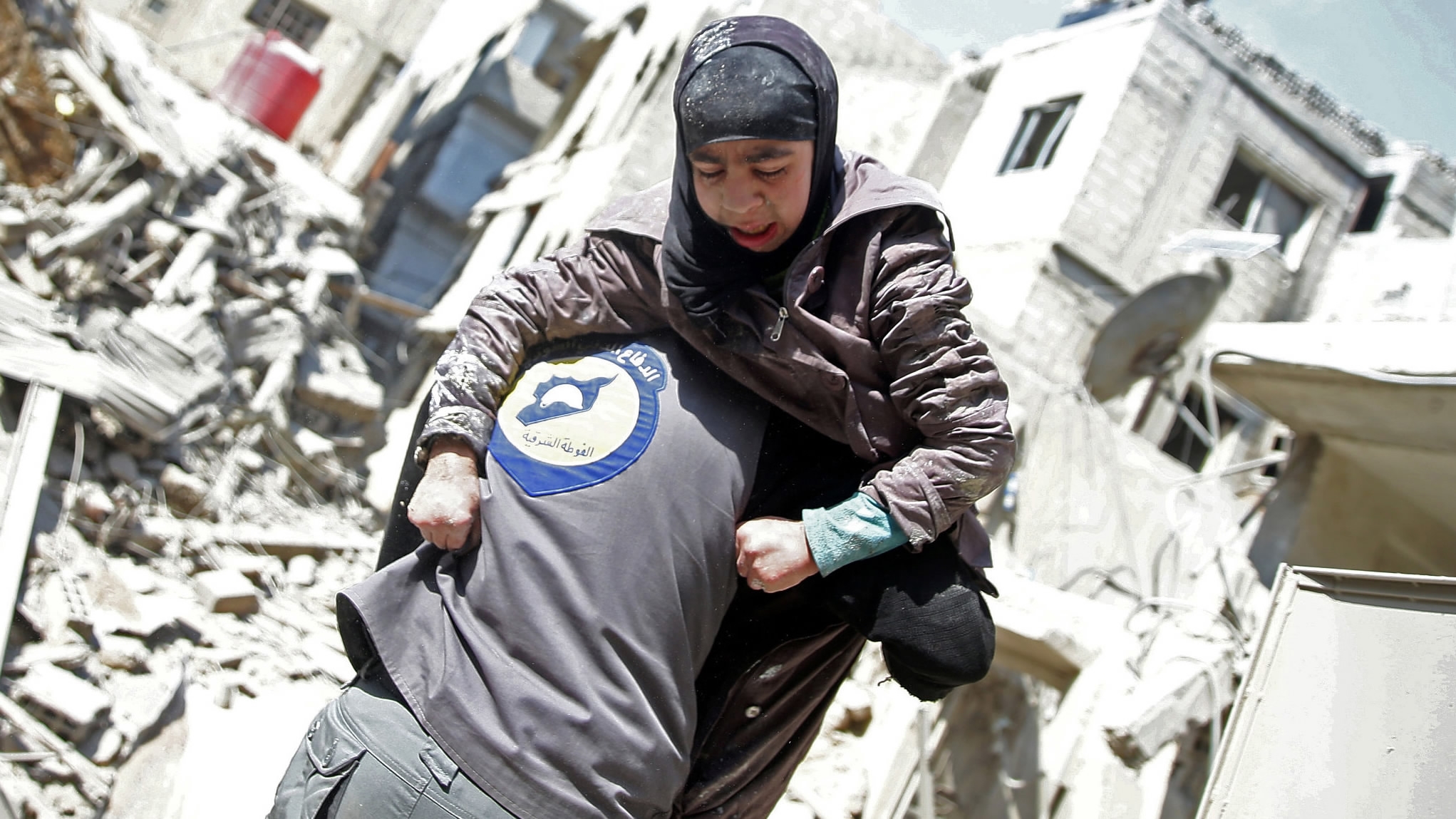
Politics
09:03, 22-Feb-2018
UN mulls Syria ceasefire vote as over 300 killed in eastern Ghouta
CGTN

The UN Security Council could vote as soon as Thursday on a draft resolution demanding a 30-day ceasefire in Syria, as residents of the rebel-held eastern Ghouta district of Damascus said they were waiting their "turn to die" on Wednesday amid intense bombardments by pro-government forces.
At least 38 people died on Wednesday in the rebel-held enclave near the Syrian capital. At least 310 people have been killed in the district since Sunday night and more than 1,550 injured, the Britain-based Syrian Observatory for Human Rights war monitor said.

Wounded Syrians seek treatment at a make-shift hospital in Kafr Batna following a government bombardments on the besieged eastern Ghouta region on the outskirts of the capital Damascus on February 21, 2018. /VCG Photo
Wounded Syrians seek treatment at a make-shift hospital in Kafr Batna following a government bombardments on the besieged eastern Ghouta region on the outskirts of the capital Damascus on February 21, 2018. /VCG Photo
Eastern Ghouta, a densely populated agricultural district, is the last major area near the capital still under rebel control. Home to 400,000 people, it has been besieged by government forces for years.
A massive escalation since Sunday, featuring rocket fire, shelling, airstrikes and helicopter-dropped barrel bombs, has made the bombardment one of the deadliest of the Syrian civil war.
UN considers ceasefire vote
The United Nations has denounced the bombardment, which has struck hospitals and other civilian infrastructure, saying such attacks could be war crimes.
UN Secretary-General Antonio Guterres appealed for an "immediate suspension of all war activities in eastern Ghouta." Speaking to the UN Security Council, Guterres said residents were living in "hell on earth."
Guterres expressed support for a Swedish and Kuwaiti push for the 15-member council to demand a 30-day ceasefire in Syria. Diplomats said the council could vote on a draft resolution in the coming days. But Assad's veto-wielding ally Russia has called the proposal "not realistic."

United Nations Secretary-General Antonio Guterres. /VCG Photo
United Nations Secretary-General Antonio Guterres. /VCG Photo
"We cannot simply decide that there is a ceasefire. That's a long and complex process to achieve," Russian UN Ambassador Vassily Nebenzia told Reuters of the draft ceasefire resolution. "But we are working on (the draft)."
Moscow on Wednesday called for the Council to meet publicly on Thursday to discuss the situation in Ghouta.
‘Waiting to die’
The pace of the strikes appeared to slow overnight, only to intensify again later on Wednesday, the Observatory said. Pro-government forces fired hundreds of rockets and dropped barrel bombs from helicopters on the district's towns and villages.
"We are waiting our turn to die. This is the only thing I can say," said Bilal Abu Salah, 22, told Reuters. "Nearly all people living here live in shelters now. There are five or six families in one home. There is no food, no markets.”

A rescue worker holds an injured girl in the rebel-held besieged town of Hamouriyeh, eastern Ghouta, near Damascus, Syria, February 21, 2018. /VCG Photo
A rescue worker holds an injured girl in the rebel-held besieged town of Hamouriyeh, eastern Ghouta, near Damascus, Syria, February 21, 2018. /VCG Photo
The International Committee of the Red Cross (ICRC) called on Wednesday for humanitarian access to Ghouta, especially to reach wounded people in critical need of treatment.
"The fighting appears likely to cause much more suffering in the days and weeks ahead," said Marianne Gasser, ICRC's head of delegation in Syria. "This is madness and it has to stop."
Medical charity Médecins Sans Frontières said 13 hospitals had been hit and damaged or destroyed in the past three days.
Damascus denies launching the inaccurate barrel bombs whose use has been condemned by the United Nations.
Is Russia involved in the bombing?
The Observatory said many of the planes over Ghouta appear to be Russian. Syrians say they can distinguish between Russian and Syrian planes because the Russian aircraft fly higher.
Kremlin spokesman Dmitry Peskov on Wednesday described as "groundless" accusations that Russia bears some of the blame for civilian deaths in eastern Ghouta.
A commander in the coalition fighting on behalf of Assad's government told Reuters overnight the bombing aims to prevent the rebels from targeting the eastern neighborhoods of Damascus with mortars. It may be followed by a ground campaign.
"The offensive has not started yet. This is preliminary bombing," the commander said.
Are the rebels fighting back?
The Russian military said talks to peacefully resolve the situation in eastern Ghouta had broken down and rebels there had ignored calls to cease resistance and lay down their arms.
A statement by Russia's ceasefire monitoring center in Syria, which is run by the Russian military, also accused the rebels of preventing civilians from leaving the conflict zone.
A rebel official, Mohammad Alloush, the political chief of Jaish al-Islam, earlier told Reuters there had been attempts to mediate a ceasefire, but he ruled out the possibility of any deal to evacuate the residents of eastern Ghouta.
Rebels have also been firing mortars on the districts of Damascus near eastern Ghouta, wounding seven people on Wednesday, state media reported. Rebel mortars killed at least six people on Tuesday.
"Today, residential areas, Damascus hotels, as well as Russia's Centre for Syrian Reconciliation, received massive bombardment by illegal armed groups from eastern Ghouta," Russia's Defence Ministry said late on Tuesday.
Eastern Ghouta is one of a group of "de-escalation zones" under a diplomatic ceasefire initiative agreed by Assad's allies Russia and Iran with Turkey which has backed the rebels. But a rebel group formerly affiliated with al Qaeda is not included in the truces and it has a small presence there.
Conditions in eastern Ghouta, besieged since 2013, had increasingly alarmed aid agencies even before the latest assault, as shortages of food, medicine and other basic necessities caused suffering and illness.
(With input from agencies)
6928km

SITEMAP
Copyright © 2018 CGTN. Beijing ICP prepared NO.16065310-3
Copyright © 2018 CGTN. Beijing ICP prepared NO.16065310-3